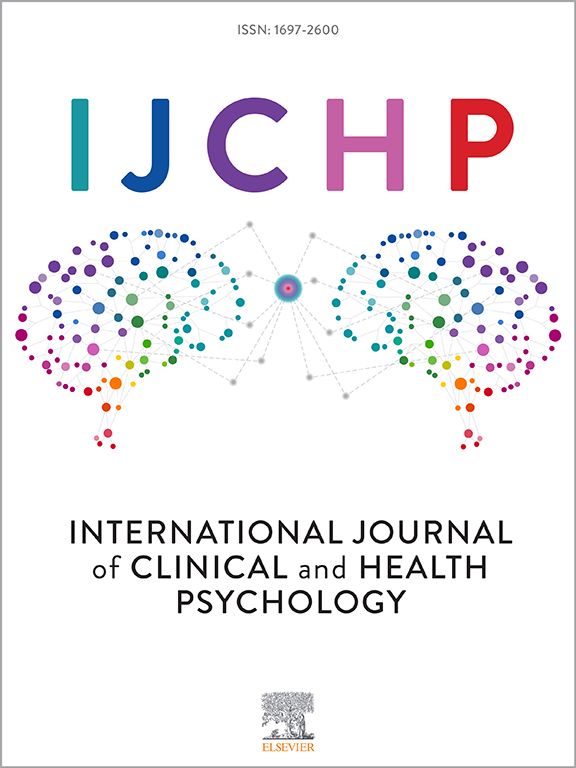Restless nights, cold hearts: Poor sleep causally blunts empathy
IF 4.4
1区 心理学
Q1 PSYCHOLOGY, CLINICAL
International Journal of Clinical and Health Psychology
Pub Date : 2025-01-01
DOI:10.1016/j.ijchp.2025.100548
引用次数: 0
Abstract
Poor sleep is pervasive in modern society. Poor sleep is associated with major physical and mental health consequences, as well as with impaired cognitive function. Less is known about the relationship between sleep and emotional and interpersonal behavior. In this work, we investigate whether poor sleep impairs empathy, an important building block of human interaction and prosocial behavior. We aimed to capture the effects of poor sleep on the various aspects of empathy: trait and state, affect and cognition.
Study 1 (n = 155) assessed daily habitual sleep over several days, and global sleep quality in the past month. Participants who reported worse sleep quality exhibited lower empathic caring and perspective-taking traits. Study 2 (n = 347) induced a one-night disruption of sleep continuity to test a causal relationship between sleep and empathy. Participants in the sleep disrupted condition had to briefly wake up five times over the night, whereas the sleep-rested controls slept normally. In the next morning, participants’ empathy and prosocial intentions were assessed. Participants in the sleep disruption condition exhibited lower empathic sensitivity and less prosocial decision-making than sleep-rested controls.
The main contribution of this work is in providing a robust demonstration of the multi-faceted detrimental effects of poor sleep on trait and state empathy. Our findings demonstrate that poor sleep causally impairs empathic response to the suffering of others. These findings highlight the need for greater public attention to adequate sleep, which may impact empathy on a societal level.
不安分的夜晚,冰冷的心:睡眠不好会削弱同情心
睡眠不足在现代社会很普遍。睡眠不足与严重的身心健康后果以及认知功能受损有关。人们对睡眠与情绪和人际行为之间的关系知之甚少。在这项工作中,我们研究了睡眠不足是否会损害移情,移情是人类互动和亲社会行为的重要组成部分。我们的目的是捕捉睡眠不足对共情的各个方面的影响:特征和状态,情感和认知。研究1 (n = 155)评估了几天的日常习惯性睡眠,以及过去一个月的整体睡眠质量。报告睡眠质量较差的参与者表现出较低的共情关怀和换位思考特征。研究2 (n = 347)诱导睡眠连续性中断一晚,以测试睡眠与共情之间的因果关系。睡眠中断组的参与者必须在夜间短暂醒来五次,而睡眠充足的对照组则正常睡眠。第二天早上,参与者的同理心和亲社会意图被评估。与睡眠充足的对照组相比,睡眠中断组的参与者表现出更低的共情敏感性和更少的亲社会决策。这项工作的主要贡献是提供了一个强有力的证据,证明了睡眠不足对特质和状态共情的多方面有害影响。我们的研究结果表明,睡眠不足会损害对他人痛苦的共情反应。这些发现强调了公众需要更多地关注充足的睡眠,这可能会影响社会层面的同理心。
本文章由计算机程序翻译,如有差异,请以英文原文为准。
求助全文
约1分钟内获得全文
求助全文
来源期刊

International Journal of Clinical and Health Psychology
PSYCHOLOGY, CLINICAL-
CiteScore
10.70
自引率
5.70%
发文量
38
审稿时长
33 days
期刊介绍:
The International Journal of Clinical and Health Psychology is dedicated to publishing manuscripts with a strong emphasis on both basic and applied research, encompassing experimental, clinical, and theoretical contributions that advance the fields of Clinical and Health Psychology. With a focus on four core domains—clinical psychology and psychotherapy, psychopathology, health psychology, and clinical neurosciences—the IJCHP seeks to provide a comprehensive platform for scholarly discourse and innovation. The journal accepts Original Articles (empirical studies) and Review Articles. Manuscripts submitted to IJCHP should be original and not previously published or under consideration elsewhere. All signing authors must unanimously agree on the submitted version of the manuscript. By submitting their work, authors agree to transfer their copyrights to the Journal for the duration of the editorial process.
 求助内容:
求助内容: 应助结果提醒方式:
应助结果提醒方式:


